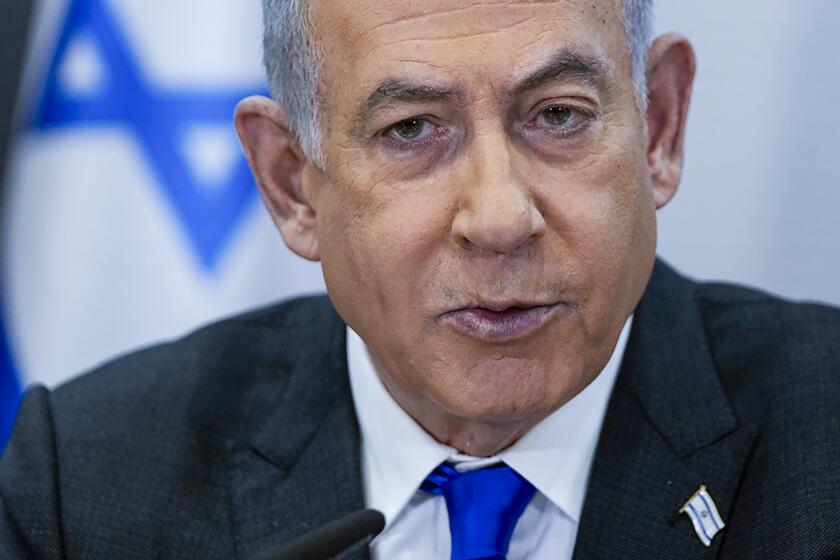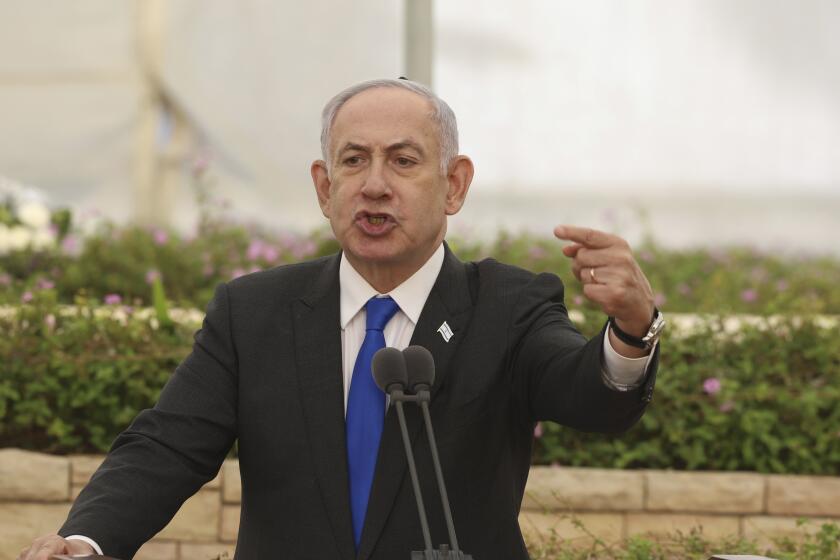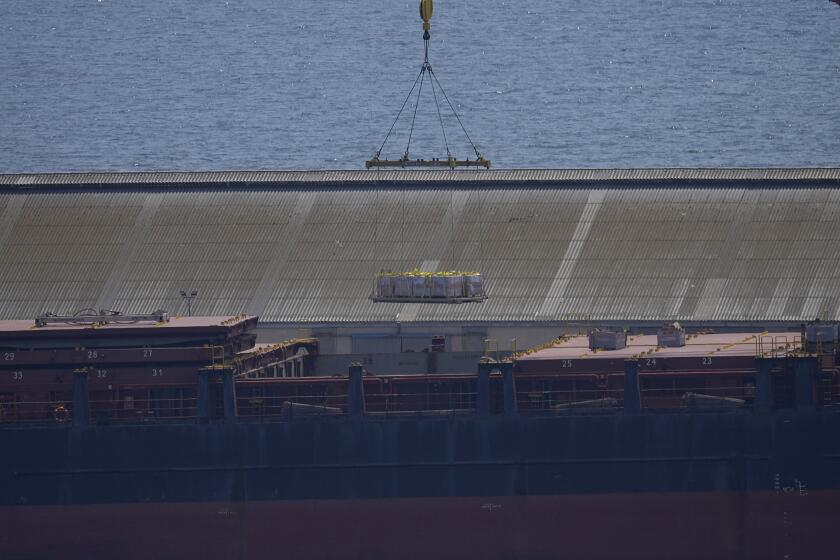Israeli Prime Minister Benjamin Netanyahu makes surprise Gaza visit

- Share via
JERUSALEM — Israeli Prime Minister Benjamin Netanyahu made a surprise visit to troops in southern Gaza on Thursday, just days before he was set to give a speech to the U.S. Congress, saying it was essential that Israel keep control of a piece of land along the territory’s border with Egypt.
In his comments at Gaza’s southernmost city of Rafah, Netanyahu sounded a tone of triumph in the campaign against Hamas and underscored the differences that still remain in months-long attempts to reach a cease-fire.
A U.S.-backed outline for a deal calls for an eventual full Israeli withdrawal from the Gaza Strip in return for a full release of hostages by Hamas, something a continued Israeli grip on the Rafah border crossing and nearby border strip would appear to contradict.
Netanyahu’s visit to Rafah was announced hours after Israel’s far-right national security minister, Itamar Ben-Gvir, visited Jerusalem’s most sensitive holy site. Ben-Gvir’s move also could disrupt the talks over a cease-fire in the 9-month-old Israel-Hamas war.
Ben-Gvir, an ultranationalist settler leader, said he went up to the site to pray for the return of Israeli hostages “but without a reckless deal, without surrendering.” Israeli negotiators landed in Cairo on Wednesday to keep working on the talks.
After a key partner bolted from the government, Israeli Prime Minister Benjamin Netanyahu has dissolved the War Cabinet tasked with steering the war in Gaza.
Tensions over the compound have fueled past rounds of violence. The Palestinian Authority Foreign Ministry condemned Ben-Gvir’s visit as a “provocative intrusion” that endangered the fragile status quo regarding the site, which is revered by Jews as the Temple Mount and by Muslims as Haram al Sharif, a holy site and important national symbol.
The two leaders’ visits came hours after Israel’s parliament overwhelmingly passed a resolution rejecting the establishment of a Palestinian state. The vote was largely symbolic and meant to send a message ahead of Netanyahu’s trip to the United States.
Netanyahu’s office announced his visit to Rafah once the prime minister had exited the territory. Israeli forces invaded Rafah in early May, forcing most of the 2 million Palestinians sheltering there to flee. Rafah, once a crucial entry point for humanitarian aid, is now a dusty ghost town full of bullet-riddled apartment buildings with blasted-out walls and shattered windows.
Netanyahu toured the Rafah crossing with Egypt and from a viewpoint saw the Philadelphi corridor, a narrow strip running the length of the Gaza side of the border with Egypt. The Israeli military seized control of both early in the Rafah assault, and it says that since then troops have uncovered Hamas smuggling tunnels into Egypt.
Congressional leaders have invited Israeli Prime Minister Benjamin Netanyahu to deliver an address at the U.S. Capitol.
Netanyahu said his talks with troops and commanders had made him “stronger in the understanding that our control of the Philadelphi corridor and of the Rafah crossing are essential going forward,” his office said in a statement.
Israeli leaders have signaled that the Rafah operation is close to finished — a step that is expected to lead to a lower-intensity phase of the war and could possibly improve conditions for a cease-fire. Israel has said Rafah was Hamas’ last major stronghold in Gaza.
But differences still remain in the talks over the three-phase deal, which starts with a halt in fighting and a partial hostage release. The outline says the deal is to lead to an end to the war and complete Israeli withdrawal — a top Hamas demand for a full hostage release. But it also says the two sides must negotiate the terms for that during the initial cease-fire phase. Hamas wants stronger guarantees, while Israel has suggested it will demand Hamas be removed from power in those negotiations.
In his comments in Rafah, Netanyahu also said Israel demands “a maximum number of hostages” to be released in the first phase. That’s likely to fuel Hamas’ suspicions he aims to get out as many hostages as possible and then resume fighting.
Overnight Israeli strikes Thursday in central Gaza killed at least 11 people, according to the Hamas-run Civil Defense organization and hospitals. At least two children and two women were killed in airstrikes on a house and a car.
Israeli Prime Minister Benjamin Netanyahu says U.S. is withholding weapons needed for the war in Gaza, but others say that’s not the whole story.
In recent weeks, Israel has stepped up strikes in central Gaza, where many Palestinians have fled to escape fighting in other parts of the territory. Israel’s military said it targeted a senior commander from the militant group Islamic Jihad’s naval forces in Gaza City and another Islamic Jihad commander responsible for launches in the city of Shijaiyah.
Ben-Gvir said while standing in front of the iconic golden Dome of the Rock in the Al Aqsa Mosque compound that he “is praying and working hard” to ensure that Netanyahu will not give in to international pressure and will continue with the military campaign in Gaza.
Ben-Gvir has frequently visited the site during times of conflict, drawing condemnation. He last visited in May to protest countries unilaterally recognizing Palestinian statehood.
As a key coalition partner, Ben-Gvir also has the power to rob Netanyahu of his parliamentary majority and try to force early elections.
Ben-Gvir has used his influence to push forward pet projects and encourage Netanyahu to press ahead with the war in Gaza in the face of widespread calls to reach a cease-fire deal that would bring home hostages.
He has been convicted eight times for offenses that include racism and supporting a terrorist organization. As a teen, his views were so extreme that the army banned him from compulsory military service.
Netanyahu says a U.S. threat to withhold arms will not stop the war in Gaza, indicating Israel might proceed with an invasion of the packed city of Rafah.
On Friday, the U.N.’s International Court of Justice is expected to issue an advisory opinion on the legality of Israel’s 57-year occupation of the Palestinian territories, an ongoing legal case not directly connected to the current war.
Israel also said it killed a senior commander affiliated with Hamas and other militant groups in Lebanon. In a statement, Al Jamaa al Islamiya, or the Islamic Group, identified him as Mohammad Hamed Jabbara and said he was killed in a strike in the Bekaa area in Lebanon near the Syrian border. The Israeli military described Jabbara as a Hamas operative in Lebanon who helped coordinate Islamic Group attacks targeting northern Israel.
The war in Gaza, which was sparked by Hamas’ Oct. 7 attack on southern Israel, has killed more than 38,600 people, according to the territory’s Health Ministry, which does not distinguish between combatants and civilians in its count. The war has created a humanitarian catastrophe in the coastal Palestinian territory, displaced most of its 2.3 million people and triggered widespread hunger.
Hamas’ October attack killed 1,200 people, mostly civilians, and militants took about 250 hostage. About 120 remain in captivity, with about a third of them believed to be dead, according to Israeli authorities.
Lidman writes for the Associated Press. AP writer Kareem Chehayeb in Beirut contributed to this report.
More to Read
Sign up for Essential California
The most important California stories and recommendations in your inbox every morning.
You may occasionally receive promotional content from the Los Angeles Times.














